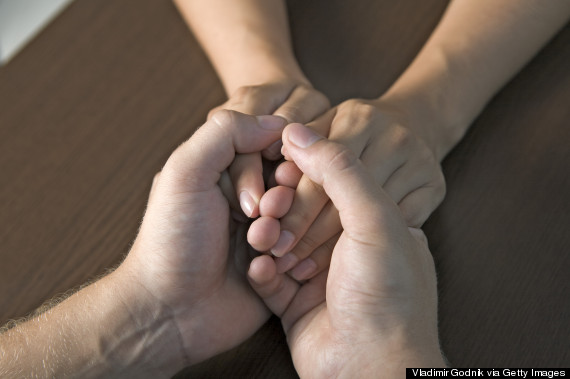The loss on Monday of Robin Williams, one of our most beloved comedic legends, came as a shock to fans, who mourned his death both publicly and privately. But of course their devastation does not even come close to that felt by the friends and family who knew him best.
While any cause of death, particularly one that can feel abrupt, leaves loved ones coping with feelings of tremendous loss and grief, suicide can bring with it a unique set of challenges. Those left behind can feel sadness that someone so close to them felt so much pain that they could no longer stand to live through it.
For those of us on the outside looking in at neighbors, colleagues and friends suffering through this irrevocable pain of losing someone to suicide, we naturally want to jump to their aide in any way possible. But some offers of support may be more useful than others. The Huffington Post's mental health editor, Lloyd Sederer, M.D., who is also the medical director of the New York State Office of Mental Health, described the ways in which coping with death by suicide can vary -- and how friends of the bereaved can respond.
Here are seven things to remember when trying to help someone who has lost someone to suicide.
Let them come to you.

"Most people under those circumstances, particularly with a stranger, don’t want to open the wound with someone else," said Sederer. "It’s hard enough for them to bear it with themselves or work through with people whom they know and trust and are close. As a neighbor or as a coworker, you try and let the moment be as normal as possible. If it's picking up kids from a soccer game, that means asking how the game went. Normalize the moment."
Remember the good times.

When the person is ready to open up to you, genuinely acknowledging the tragedy they are experiencing goes a long way. But what can be more important is reminding them of the happy moments they shared with the person.
"Try to help somebody find memories that are positive," said Sederer, pointing to the many joyous remembrances of Robin Williams as examples. "Saying something kind and positive about somebody is a way to make a positive connection through someone who’s lost."
In her statement to the New York Times' Dave Itzkoff, Susan Schneider, Williams' wife, said, "As he is remembered, it is our hope that the focus will not be on Robin's death but on the countless moments of joy and laughter he gave to millions."
In this respect, death by suicide is treated no differently than any other cause. Spend time talking about how great of a person they were to be around, how they lit up any room they walked into, how they were truly reliable and trustworthy. Help people celebrate how they lived rather than drawing increased attention to how they died.
Ask intelligent questions.

When someone begins sharing with you the pain they feel -- often in the form of a statement like, "I just can't understand why he did this..." -- resist the natural urge to offer reassurance or weigh in with a perspective of your own. Instead, ask them to talk about themselves.
"You want to stay away from, “I'm sure you did everything you could,” or something like that because that’s gratuitous," said Sederer. "What can work is, “What thoughts have you had about this? What did you see? What was it like for you recently with them?” These questions enable somebody to open up slowly, and as far as they want to go."
Be good company.

As much as we may want to offer reassurance or comfort to those who are dealing with this trauma, the fact of the matter is that they will be inconsolable at first. The old adage, "Actions speak louder than words," rings true during this time as you try to strike a balance between intrusive and distant with the person you'd like to help.
"The comfort comes from being able to sit with somebody, not say anything and not expect anything," said Sederer. "The comfort is putting your arm around somebody’s shoulder, giving them a hug, or enabling them to feel able to cry or run through the millions of thoughts in their head as they try to figure out what just happened. That’s really where the comfort comes from."
Give them space, but not too much.

A common reaction to incredible loss is the desire to be alone to work through one's thoughts and emotions. However, you can give a person mental and mental space while still being physically present.
"You could be in the next room, saying, 'I’m here if you need me, I’m just going to go make some coffee,'" said Sederer. "Sometimes people really do need to be by themselves, but being only alone is not how people manage. We’re all deeply involved, we’re all relationship-based. We need some time by ourselves to breathe maybe, but we also need to be with other people -- and that doesn’t mean speaking. It just means being with someone else. Being in the same room, knowing that someone is around."
Offer help in practical ways.

They may not know it at first -- or be ready to ask for it -- but the person suffering from this loss is undoubtedly going to need help after their life is turned upside down. Give them time to begin the mourning process, but don't hesitate to jump in and offer help in easy, useful ways.
"Ask: 'How can I be helpful to you? Can I go shopping for you? Can I take over the carpool? Are there people you want me to call for you to explain what has happened?'" said Sederer. "Practical things that are just too much for a person to cope with, whether they’re just everyday chores or emotionally demanding activities."
Be patient, don't rush them, and stick to the tangible things that make their day-to-day living that much more manageable. They may not know they need it, and they may not be able to thank you, but you will undoubtedly be making a difference.
Avoid problem-solving for them.

As they work to cope with this loss, there will come a time when they are ready to tackle the tougher questions of what happened, what they saw, what they did about it, and whether they could have done more with their loved ones. To begin the reparation process, they have to put it into perspective -- and while you can help, they need to do it for themselves.
"You want to enable people to problem solve themselves, not try to solve their problems for them," said Sederer. "Ask: 'What are the thoughts you had then? What are the thoughts you have now?' You’re asking intelligent questions, but you want somebody to problem solve with your help. Someone can carefully walk though what they did do and what did happen with hours and days of self-reflection. A person gets there when they’re able to talk aloud about it."
Have a story about depression that you'd like to share? Email strongertogether@huffingtonpost.com, or give us a call at (860) 348-3376, and you can record your story in your own words. Please be sure to include your name and phone number.
Need help? In the U.S., call 1-800-273-8255 for the National Suicide Prevention Lifeline.
